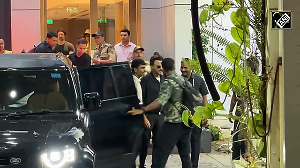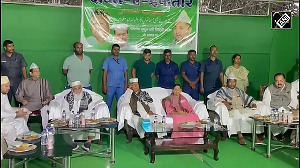The news was flat out, without any emotion -- 'Veteran journalist and former editor of the now defunct tabloid Blitz Russi Karanjia passed away in Mumbai on Friday.'
He certainly deserved a warmer obituary. He was the last post of an era that connected the colonial times with the poster boys of the socialist dreams. Tabloid journalism was new, Russi made it into a habit for millions.
And a hope too, for those who sought to take on the wrongdoers. A whistle blower, a peoples' cop. That was his image in our hearts. More than a newspaper, Blitz became an institution in his times. None could rival him. His élan was of a different class.
Russi, the doyen of Indian journalism, better than those big mouths we see today and much more humane than the editorial writers who sell their piece by word count, is no more. In fact with the sad transfer of Blitz, he became a recluse and hardly anyone heard of him afterwards.
I remember September 1981, walking into the precincts of the Blitz office in Fort, Mumbai, which was the tabloid of the nation in those days.
I was a fresher, trying to get assignments from any which paper on any topic, but write I would as my life depended on it.
I had written a few pieces for the Hindustan Times and The Statesman then; was awaiting an appointment with Vimla Patil and meanwhile someone suggested try Blitz in case Karanjia gave me a chance.
I had no recommendation and none knew me in that big, high pedestal world of words. After negotiating the wooden stairs I saw the pattawala who asked me whom I wanted to see, and I said Russi Karanjia.
He gave a blank look and directed me to his secretary, a young Parsi lady. She asked why I wanted to see him. I said I had come from Dehra Dun and wanted to write for him. She asked me to see Mr Trikannad first; he was perhaps News Editor then. Trikannad was all smiles listening to me and I got a chance to see Russi immediately.
Russi's room was posh and yet business like. He had a distinct aura of authority, incisiveness and was a bit blunt too.
I have rarely found people who have the patience to listen. He was a listener who would make his guest quite comfortable and then without bothering about the after-effects, would bluntly announce his decision -- final and non-negotiable.
He ordered tea for me and wanted me to tell him all that I had stored for this moment, my background, previous writings and my purpose to be a journalist.
I said I had worked on certain stories on tribal people; they were the most ignored, misunderstood and disadvantaged people, yet newspapers didn't want to write about them unless they appeared in a Republic Day show or presented themselves in ghotul-type (a pre-marriage custom in Bastar) stories interpreted in the press as 'free sex societies'.
'Sir, I want to write on tribals.'
'Go ahead. You get an advance and write a story per month,' Russi was quick and overwhelmingly nice.
For the next two years I wrote regularly and my first payment, after having it cleared from Trikannad and going to their accounts office in a separate building, was Rs 500, not bad in 1981 for 1,000 words, plus travel expenses reimbursed.
He never edited the interpretations I gave to my real life stories from tribal areas like Kushal Garh and Banswara, and one of it became quite a news when a tribal young man was burnt alive in Thandla police thana.
Even an interview with Rani Gaidinliu supporting Hindu movements was published, though at that time Blitz was still Leftist with Khwaja Ahmad Abbas's column on the last page and a bikini clad lady's photo on the top right corner.
Russi was a darling of the Left, a great socialist ideologue and a focus of progressive writers who adored him immensely for his hard hitting assaults on 'communal' forces.
He unearthed scandals and scams every week. His paper spelled terror in the messy corridors of politics and corrupt bureaucracy.
His interviews with world legends like Khrushchev, Nasser and the Shah of Iran made international headlines.
Even in this age and times, a journalist would have to try really very hard to come close to his standards.
Yes, he published juicy gossip and titillating pictures of damsels too, and used all channels of the trade to stay as a perfectionist at the top.
The fizz began lessening when the paper didn't change with the new era of a literate class, which was fast moving and upwardly mobile.
Russi was a large hearted person who loved the good life. He had a powerful pen, spared none and earned fame and awe that remains unparalleled even today.
He was a hard taskmaster, appeared rude sometimes but his passion for the best couldn't find a match in the changing times of Indian journalism.
In his later years he turned deeply spiritual and the final turning point came during the Ayodhya movement. He was the first editor in a mainstream journal who supported the Ramjanmabhoomi movement openly. First Francois Gautier's column began appearing in Blitz supporting the Ram agitation spiritedly with impeccable logic.
Russi was accused of indulging in yellow journalism, making big money and courting the favours of the Shah of Iran. He didn't care. He was what he was, unsparing to the wicked and a solid rock support to the noble causes he espoused.
His fiery writings will remain a benchmark in the annals of Indian journalism.
Tarun Vijay is Editor, Panchjanya, the Hindi weekly published by the Rashtriya Swayamsevak Sangh






 © 2025
© 2025